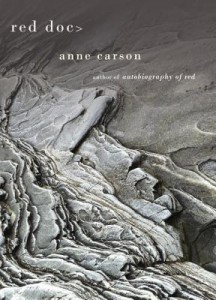 Red Doc>
Red Doc>
by Anne Carson
Knopf, March 2013
192 pages / $24.95 Buy from Amazon or IndieBound
As a semblance of promotion for her new book, Anne Carson wrote: “Recently I began to wonder what happened to them in later life. Red Doc> continues their adventures in a very different style and with changed names. To live past the end of your myth is a perilous thing.”
Carson made a surprising move releasing a sequel to 1998’s Autobiography of Red, a novel in verse about a boy with wings named Geryon and his love affair with Herakles.
Though sequels are better known in blockbuster films, the constellation of literature has its share of sequels, if not always in predictable forms.
Grace Paley uses her character Faith in multiple books as does Junot Diaz with his narrator, Yunior. Anthony Powell’s A Dance to the Music of Time, a twelve-novel cycle, delivers an interesting take on the sequel—a word whose etymological roots entail sequence, a body of followers, consequence, descendants.
What a formulaic generic choice a sequel could seem for Carson, who considers herself an instructor and translator of Ancient Greek first, and a literary wunderkind (my word) second.
But doesn’t translating ancient works often involve a form of sequencing? There was nothing ancient about the Herakles (Hercules) myths when first recounted. To translate requires fidelity to the original language and intent, while sometimes taking license to contemporize and update the story.
In Red Doc>, Geryon is no longer a boy. He still likes photographs. He is still homosexual. He still has wings.
G, as he’s now called, is a military veteran. And whereas Geryon traveled to South America, G drives northward into an icy expanse with a fellow vet named Sad, a reconfigured Herakles.
Their car breaks down and they find themselves at the mouth of a cave. G’s wings are itching something fierce. “Stiffened/wing muscles pull hard/against their roots and/move into a lift,” Carson writes of her protagonist.
Once G is in the air, “he opens his mouth/in a cry as red sadness/pours away behind him/and the ancient smell of/ice floods every corner of/his skull.”
In this sequel, Carson writes how cell death in the body leads to differentiation, the lost tissue between fingers and toes allowing for discrete digits. This lack of cell death has kept the wings intact on G.
What if humans really had wings, in a type of bodily atavism? What if mythical characters like Geryon and Herakles were airlifted into contemporary existence?
Wonderful things arise when categories aren’t so strict. Red Doc>, a contemporary tale heavily reliant on myth, is both a novel and a work of poetry.
This hybrid form allows for some interesting contradictions. Carson employs slash marks (/), typically used to denote line breaks in poetry, rather to separate dialogue. In doing so, the slash is reappropriated and used to solve a common problem of fiction—how to write extended dialogue scenes without making the page look ripped from a film script, eschewing descriptions of characters or settings.
Red Doc> is largely built on narrow swaths in the middle of pages that look like poetry, only their enjambment is predetermined by the form. Rectangular prose is flanked by white space. Carson’s main exceptions are an interstitial series of 11 poems called “Wife of Brain” that function as a kind of supranarrator not unlike a Greek chorus.
The book is a sequel, sure, but one with more originality than most original works.
Since The Autobiography of Red, fifteen years have passed, and thousands of years since the Herakles myths. So perhaps this sequel will become part of a larger sequence, and perhaps we are the body of followers, Anne Carson’s readers and admirers—who will gladly wait a couple decades to see if she goes for the trilogy.
***
Devan Schwartz is a newspaper reporter and a graduate of the Portland State University MFA program in fiction writing. His work has appeared in the New Orleans Review, Stoneboat, New Plains Review, Rio Grande Review, and Asia Literary Review. He is at work on his first novel.
Tags: Anne Carson, Devan Schwartz, Red Doc>

I’m working on an essay on Red Doc>, and I’d love to brain pick you. Email me? Lily.Hoang.326[at]gmail. Thoughtful review. We have some differing readings, but I guess that’s the point of reading, yes?